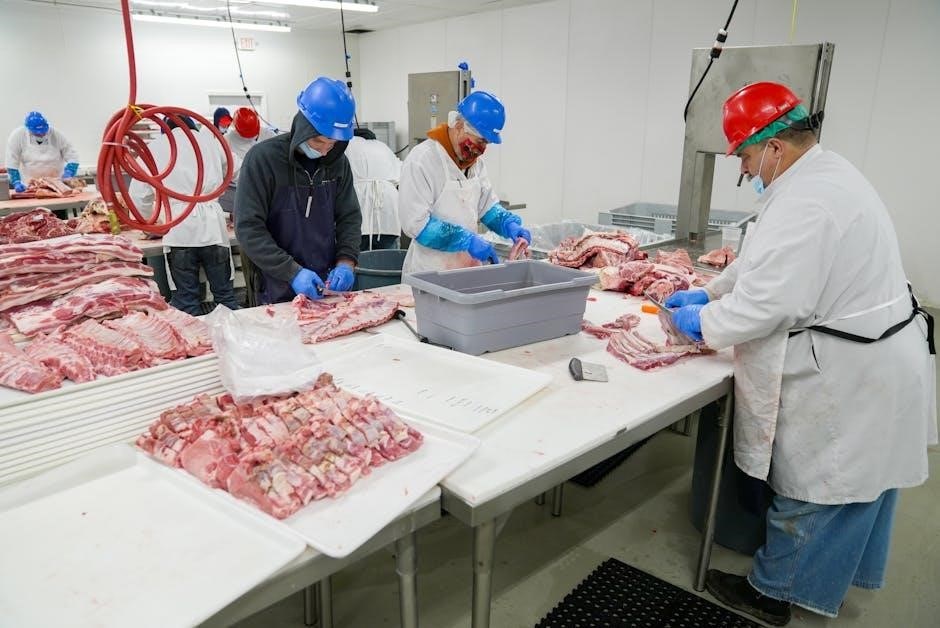The Meat Industry Award Pay Guide (MA000059) outlines minimum wages, classifications, and conditions for employees in Australia’s meat industry, ensuring fair and compliant employment practices annually.
1.1 Overview of the Meat Industry Award MA000059
The Meat Industry Award MA000059 is a legal document issued by Fair Work Australia, governing employment conditions in the meat industry. It applies to businesses involved in meat processing, manufacturing, and related activities. The award covers most employers except unincorporated businesses in Western Australia. It outlines pay rates, classifications, allowances, and penalties, ensuring fair wages and conditions for employees. Updates occur annually, with new rates effective from the first pay period on or after 1 July each year.
1.2 Importance of Understanding the Pay Guide
Understanding the Meat Industry Award Pay Guide is crucial for employers and employees to ensure compliance with legal obligations and fair employment practices. It provides clarity on pay rates, classifications, allowances, and penalties, helping to avoid disputes and ensure correct entitlements. Staying informed about annual updates and changes is essential for maintaining compliance and fostering a fair workplace environment.
Pay Rates and Classifications
The Meat Industry Award provides detailed pay rates and classifications, ensuring fair compensation. Rates are gross, effective from the first pay period after 1 July annually.
2.1 Weekly and Hourly Pay Rates for Employees
The Meat Industry Award specifies both weekly and hourly pay rates for employees, ensuring clarity and transparency. These rates are gross amounts, excluding tax, and are updated annually from the first full pay period starting on or after 1 July each year. Employers must adhere to these rates to maintain compliance with the award’s provisions.
2.2 Classification Levels and Their Corresponding Pay Scales
Employees in the meat industry are categorized into distinct classification levels, each with predefined pay scales. These levels reflect the role’s responsibilities, expertise, and industry standards. The pay scales are detailed in the Meat Industry Award, ensuring fair compensation based on job requirements. Classification levels and their corresponding rates are outlined in the award’s clauses and summaries, providing clarity for employers and employees alike.

Allowances and Penalties
Allowances and penalties in the Meat Industry Award ensure fair compensation for specific work conditions. Allowances cover extra duties, while penalties apply to overtime, weekends, and public holidays, promoting compliance and equity.
3.1 Types of Allowances and How They Apply
The Meat Industry Award includes various allowances for specific work conditions, such as meal, travel, and tool allowances. These additional payments compensate employees for extra duties or expenses incurred while performing their roles. Employers must adhere to these provisions to ensure fair compensation, maintaining compliance with the award’s requirements and fostering workplace equity.
3.2 Penalty Rates for Weekend and Overtime Work
The Meat Industry Award specifies penalty rates for work on weekends, public holidays, and overtime. Employees receive 125% of their hourly rate for Saturday work, 150% for Sunday work, and 225% for public holidays. Overtime attracts 150% for the first two hours and 200% thereafter. These rates ensure fair compensation for work outside standard hours, aligning with the award’s provisions.
Coverage of the Meat Industry Award
The Meat Industry Award covers employers and employees in meat processing, manufacturing, and related services. It excludes certain businesses, such as some in Western Australia.
4.1 Who is Covered by the Award
The Meat Industry Award covers employers and employees in the meat industry, including those in processing, manufacturing, and related sectors. It also extends to labour hire businesses and their employees placed within the industry. This ensures comprehensive coverage, providing clear guidelines for wages, classifications, and conditions tailored to the specific needs of the sector.
4.2 Businesses and Industries Excluded from the Award
Certain businesses are excluded from the Meat Industry Award, primarily unincorporated entities in Western Australia. These exclusions ensure the award’s application remains targeted and relevant, focusing on national system employers and incorporated businesses within the meat sector, while non-covered entities operate under different regulations.
Compliance and Legal Requirements
Employers must adhere to the Meat Industry Award, ensuring compliance with minimum wages, record-keeping, and fair work laws. Non-compliance can result in penalties, emphasizing the importance of strict adherence.
5.1 Employer Obligations Under the Award
Employers must pay correct wages, maintain accurate records, and provide pay slips. They must comply with minimum wage rates, leave entitlements, and working conditions as outlined in the award. Adhering to these obligations ensures legal compliance, avoiding penalties and fines. Employers are also required to consult employees regarding changes to rosters or hours, ensuring transparency and fairness in workplace practices.
5.2 Consequences of Non-Compliance
Non-compliance with the Meat Industry Award can result in fines, legal action, and reputational damage. Employers may face penalties for underpayment, incorrect record-keeping, or violating leave entitlements. The Fair Work Ombudsman can investigate breaches, leading to costly outcomes. Ensuring compliance is crucial to avoid financial losses and maintain workplace integrity.

Leave Entitlements and Loadings
This section details annual, sick, and other leave entitlements, plus the 17.5% leave loading, ensuring fair compensation for employees in the meat industry.
6.1 Annual Leave, Sick Leave, and Other Entitlements
This section outlines the entitlements for annual leave, sick leave, and other types of leave, ensuring employees receive fair compensation and time off for personal needs; Annual leave includes a 17.5% leave loading, while sick leave provides support during health-related absences. Additional entitlements, such as bereavement leave and family and domestic violence leave, are also covered, promoting work-life balance and employee well-being.
6.2 17.5% Leave Loading Explained
The 17.5% leave loading is an additional payment made to employees when they take annual leave, calculated on top of their base pay rate. This loading is intended to help cover additional expenses incurred during holidays. It is a standard entitlement under the Meat Industry Award, ensuring employees receive fair compensation for their time off, enhancing work-life balance and financial security during breaks.
Updates and Annual Wage Reviews
The Meat Industry Award pay rates are updated annually, effective from the first full pay period on or after July 1st each year. Ensure compliance with Fair Work Ombudsman updates for the latest changes.
7.1 How Pay Rates Are Updated Annually
Pay rates under the Meat Industry Award are updated annually through the Fair Work Commission’s wage review process. Changes typically take effect from the first full pay period on or after July 1st each year; The Fair Work Ombudsman publishes revised pay guides, ensuring employers and employees have access to the latest rates and conditions. Compliance is essential to avoid legal issues. Updates reflect economic conditions and industry needs, maintaining fair standards across the meat industry.
7.2 Key Changes in the 2024 Pay Guide
The 2024 Meat Industry Award Pay Guide introduced updated pay rates, effective from the first pay period on or after July 1, 2024. Key changes include increased minimum wages, revised allowances, and adjustments to penalty rates. Classification structures and apprenticeship rates were also refined to reflect current industry standards. These updates ensure fair compensation and compliance with modern workplace requirements, benefiting both employers and employees in the meat industry.

Industry-Specific Advice
Understanding the Meat Industry Award is crucial for navigating compensation structures. Employers and employees can ensure compliance by reviewing classifications and using resources like the Fair Work Ombudsman’s guides.
8.1 Navigating the Meat Industry Compensation Structure
The Meat Industry Award MA000059 provides a structured approach to pay rates and classifications, ensuring clarity for employers and employees. Understanding the classification levels and their corresponding pay scales is essential for fair compensation. Employers should regularly review the Fair Work Ombudsman’s resources and the Pay and Conditions Tool to ensure compliance and accurate wage calculations. This helps maintain transparency and equity in the workplace.
8.2 Expert Tips for Employers and Employees
Employers should regularly review the Fair Work Ombudsman’s Pay Guide and use the Pay and Conditions Tool to ensure compliance. Employees are encouraged to understand their classification and entitlements to verify correct payments. Both parties should stay informed about annual wage updates and seek professional advice for complex queries. Leveraging digital resources ensures transparency and fairness in workplace compensation.
Digital Tools and Resources
The Fair Work Ombudsman provides essential digital tools, including the Pay and Conditions Tool and downloadable Pay Guides, to help calculate correct pay rates and entitlements accurately.
9.1 Fair Work Ombudsman Resources and Pay Guides
The Fair Work Ombudsman offers comprehensive resources, including the Pay and Conditions Tool and downloadable Pay Guides, to help employers and employees navigate the Meat Industry Award. These tools provide detailed information on pay rates, allowances, and entitlements, ensuring compliance with the award. Users can access these resources online, along with guides tailored to specific industries, to stay informed and up-to-date on employment obligations and rights.
9.2 Using the Pay and Conditions Tool
The Fair Work Ombudsman’s Pay and Conditions Tool simplifies compliance with the Meat Industry Award. This online resource allows users to calculate pay rates, allowances, and penalties specific to the award. It provides clear, industry-specific guidance, helping employers and employees verify entitlements and ensure accurate payments. Regular updates reflect the latest changes, making it an essential tool for staying compliant and informed about meat industry pay obligations.
The Meat Industry Award Pay Guide ensures fair compensation and compliance, with annual updates reflecting industry standards. Staying informed guarantees a workplace aligned with legal requirements and employee rights.
10.1 Summary of Key Points
The Meat Industry Award Pay Guide (MA000059) outlines pay rates, classifications, and entitlements for employees in the Australian meat industry. It covers allowances, penalties, and employer obligations, ensuring compliance with Fair Work standards. Annual updates reflect current wage reviews, and tools like the Pay and Conditions Tool assist with adherence. Staying informed is crucial for both employers and employees to maintain compliance and understand their rights and responsibilities effectively;
10.2 Staying Informed and Compliant
Regularly reviewing the Meat Industry Award Pay Guide ensures compliance with Fair Work standards. Employers and employees should stay updated on annual wage reviews and adjustments. Utilizing resources like the Fair Work Ombudsman’s Pay and Conditions Tool can help navigate complex requirements. Checking the Fair Work website for the latest pay guides and tools is essential for maintaining compliance and understanding entitlements effectively.

Leave a Reply